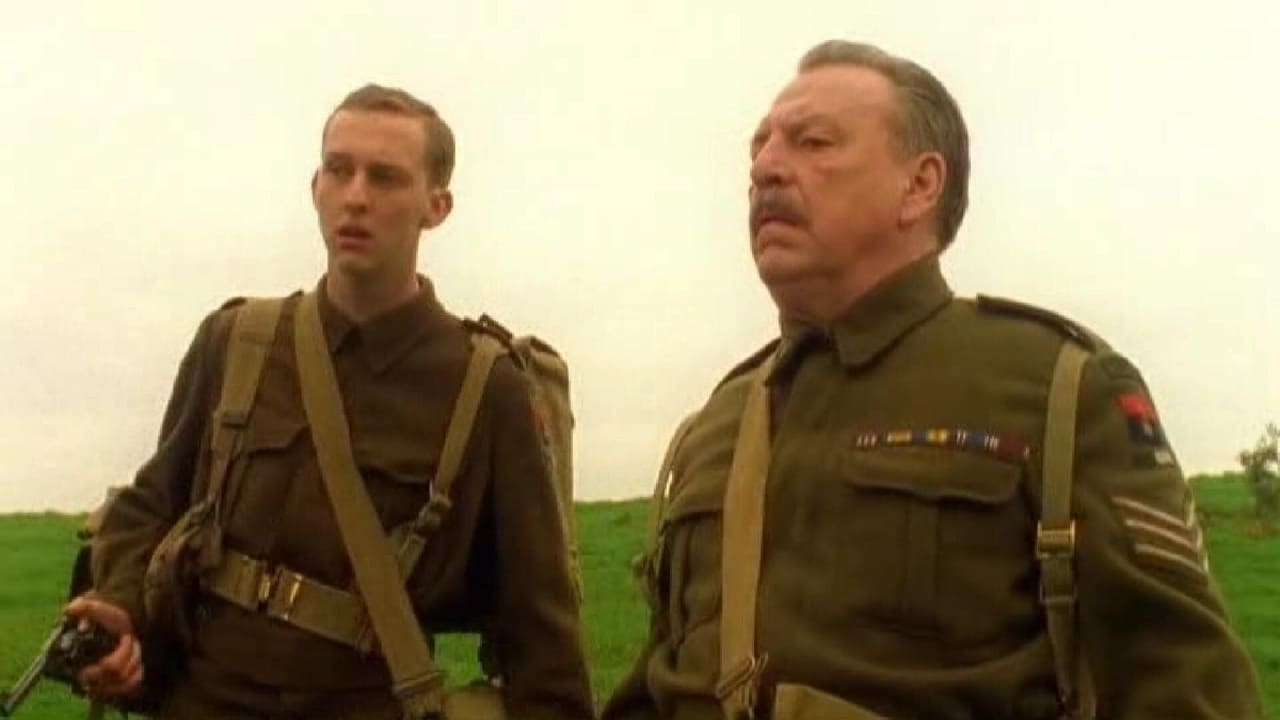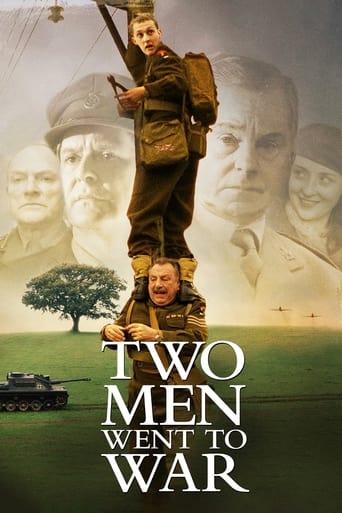Mark Hale
The UK TV premiere of "Two Men Went to War" was shown directly after a vintage episode of "Dad's Army". This was clearly a BBC progamme scheduler's attempt at mind control. The story of a has-been sergeant's personal invasion of wartime France shares a lot of territory with "Dad's Army" but "Two Men Went to War" is a pale shadow of the classic TV series.Despite being based on true events, the movie portrays its protagonists as a sort of Laurel and Hardy double act. The real Sergeant Peter King and Private Leslie Cuthbertson were a tough and resourceful duo who managed to survive on their own in enemy territory and commit several acts of sabotage before returning to home soil. Kenneth Cranham portrays his character well, despite the fact that he is in his 60s and the real Peter King was 26 in 1942. Not only this, but saddling the character King with a medal for changing a car wheel under fire in WWI cheapens the efforts of the real King, who won a Military Cross in 1944 and the DSO in Korea.Leo Bill matches Cranham in the acting stakes but plays his character as a Londoner when the real Cuthbertson was from Tyneside. I don't blame Bill for not attempting a geordie accent but it's another jangling note of inaccuracy in a story that's supposed to be "Mostly True". Cuthbertson is portrayed mainly as boyish and inept, but in reality he served as a soldier in the Durham Light Infantry after his adventures in France.I doubt that either King or Cuthbertson would have been very happy with this movie if either were still alive. While its premise is comic, too many liberties have been taken. In the movie, the 2 men are saved from being branded as deserters by an intelligence officer who credits them with the destruction of a Freya radar array. By coincidence they manage to wreck it in parallel with a British commando raid on nearby Wurzburg radar dishes. Trying to tie King and Cuthbertson's ad-hoc sabotage operation in with a bowdlerised version of the Operation Biting raid on Bruneval is simply too much. "Two Men Went to War" may be based on fact but pitching it as a "Dad's Army" - style comedy was a mistake. Surely the true story of 2 army dentists who invaded German-occupied France in 1942 was worthy of a more embellishment-free screenplay?
scottheleen
What superb movie. The tale of two English dentists, who, before D-day, decide to invade France on their own. The result is one of the most enjoyable war-movies I have ever seen. It starts of quite slow, but the pacing suits the story. There are no big build-ups leading to massive machine-gun fights with lots of dead Germans and gore. Rather, you are kept in suspense to whether their comical blunders will bear any results or whether they will manage not to kill themselves by mistake in the process. It had myself and most of my family laughing within the first couple of minutes, and we never really stopped till the end. Bravo! I hope to see more movies like this.
FilmFlaneur
(Spoilers)Two Men Went To War is an unambitious, entertaining film, if ultimately somewhat slight. Apparently based on a true story, it is a dramatised account of a passed-over sergeant and a somewhat gormless private (from the Royal Army Dental Core, for whom "an army that can't bite, can't fight!"), who go to war on their own account in 1942. Absconding from camp, they steal a fishing boat, invade occupied France, and are lucky enough to gain some military honour before facing a court martial upon their return.
Those familiar with some British WWII films of the period will quickly recognise the stereotypes: well meaning amateurs undertake derring-do in their own eccentric fashion and, against all the odds, make a success of things. Over familiar too is the national coyness towards adult relationships, as one of the two protagonists blunders in and out of two encounters with women with due virginal surprise. Replace Sergeant Peter King (Kenneth Cranham) with a Tommy Trinder or Arthur Lowe, or Private Leslie Cuthbertson (Leo Hill) with a Claude Hulbert or George Formby, and we are in the territory of The Foreman Went To France (1942) or the hugely popular antics of BBC TV series Dad's Army, which it most easily recalls.
As the AWOL duo en route to France to "take Mohammed to the mountain," King and Cuthbertson make an attractive, odd-couple pairing, whose mutual contempt and distrust, turning inevitably to self-reliance and then friendship, makes up much of the film's dramatic interest. The sergeant, nicknamed 'The Kaiser' by his fellows, has a medal from the First World War (gained, it turns out, in less than heroic circumstances) and wants to do more than stay behind during the new conflict. Private Cuthbertson wishes to live up to the memory of his father and prove himself in his own eyes and in those of his family. He daydreams of valour, either being transfixed by the aircraft that overfly the backwater of his training camp or fantasising with a live hand grenade - the incident which first brings the two men together.
Much of the film is well shot and the detail of the period is effectively reconstructed. There are niggling inaccuracies however: under threat of invasion place names and signs were removed throughout the UK to confuse likely enemy paratroopers, so it's very unlikely that Plymouth station would be conveniently indicated as here. Equally unbelievable, at a time when the blackout was mandatory, is the well-lit harbour that the two soldiers sail out of when attempting their channel crossing. Least convincing of all is the evident ease in which they arrive and leave the French coast: completely unchallenged, and stepping through light barbed wire - as if mines and fortifications of any sort had not been invented. Composer Jonathan Harvey provides a score that contains both original elements and from such period acts as Flannigan and Allen. This is well done, making the film seem richer than it is - although this viewer at least felt that the heavy handed use of Elgar during the final attack was a step too far, the blaring patriotism threatening a descent into bathos. Parallel to the unorthodox expedition by our two heroes are the preparations back in London for the start of the African campaign by Churchill and his advisors. While the two amateurs are seen as active, ambitious and enthusiastic, the military professionals in the War Rooms are shown perpetually planning and gloomy. The lethargy of those bigwigs in the know is in contrast to the get-up-and-go of those who don't know any better, the one by implication commenting on the other. By the end of the film Churchill, and presumably, via his uplifting, that of the whole war effort, has been saved from a fit of depression by the actions of the two rogue soldiers. The characteristically excellent Derek Jacobi steals the show as Churchill's top intelligence officer while, as the leader himself; David Ryall does a passable impersonation. One suspects that this small scale, likeable film will be better received in other countries than in the UK (where critical response was limited and fairly dismissive) as its gentle eccentricities can be charming. The events it portrays and the gentle irony employed are far from those in the typical Hollywood blockbuster, while its modest proceedings mean that it looks better on the small screen than the large. At the end of the day, it's a plot that needed a greater sense of absurdity and real danger than was the case here, although it remains consistently watchable. At least it's not another dismal British gangster picture...
rosie-42
What an unexpected delight is this true-ish wartime tale of two army dentists determined to do something for the war effort. A grizzled WW1 Sergeant and callow private go AWOL, heading for Cornwall and then to France armed with a rucksack of grenades, a couple of pistols and the odd dental tool. Possessing a comic lightness of touch rarely seen in Britain since the halcyon days of the Ealing comedies, this wonderful tale of British eccentricity is hilariously funny mainly because it never goes for the obvious laugh. Realisitic enough that the adventure is frequently nerve-wracking, with a splendid plot that constantly wrongfoots your guesses, the mismatched comic pair of Kenneth Cranham and Leo Bill work brilliantly. Filmed in vibrant colours so rarely seen in a British film, the movie succeeds way beyond its modest ambitions. It's the rare sort of film that banishes the blues and puts you in a good mood that lasts for ages afterwards. What more can you ask from a film than that?

